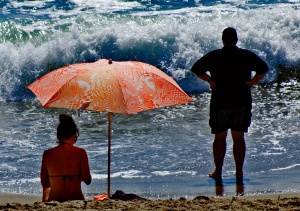American workers don’t receive much paid vacation time compared with workers in most other industrial societies. Even with vacation benefits, many workers take time off grudgingly, with guilt; and later with remorse. While on vacation, we spend a good part of our time “away” staying in touch with the boss and colleagues. This isn’t family friendly, unless, perhaps, your spouse does the same thing.
Forbes Magazine and Blog write about the phenomenon every year or two, treating it as a conundrum; i.e., “why don’t Americans take vacations.?” Big puzzle! Forbes took on the issue again recently as summer approached, but instead of trying to explain why Americans don’t vacate, they marshaled evidence on why it’s healthy and productive to take time off from work. The new approach didn’t seem to get as much attention as the conundrum articles, but it’s worth a read.
The social-psychology of American (non) vacations has often been studied in surveys, where it’s very hard to probe the deeper reasons for the behavior. This is precisely the kind of issue that needs conversational focus groups with lots of introspection. This blog article tries to fill the focus group void a bit, But, alas, it’s based mostly on my experience as both a manager and employee in a large, high performing government organization. (Ah, I bet you think that’s an oxymoron).
My organization dealt with a lot of high stakes budget and finance issues; thus colleagues and I hardly ever took vacations, but we did talk about it. Thus, any insights and anecdotes are not mine alone. I will call the agency XYZ, though you can of course easily figure out what it is by reading my blog profile or checking me out on Facebook.
We used to say that “no vacation goes unpunished at XYZ.” We had good reason to think so. Here are some of the punishments that were meted out.
At XYZ, you often got called (“paged,” in those days), while watching Yellowstone’s old geyser or lounging on the beach in Belize, with a frantic plea to answer a question from a critical customer, devise a formula, find a document, or locate a file on your computer back at the office. Some very important policy decisions, affecting many lives, were made with these kind of “deliberations,” while at least one of the parties was on his third Margarita, and barely audible on a Blackberry,
Yes, I know, “why wasn’t there someone else available to answer those questions?” Or, “why didn’t anyone else know where the computer file was located?” Good questions. As the years passed, we actually made efforts to plan for these contingencies. But too often they didn’t work. Or top managers didn’t want to mess with them. Just call Joe, even if he’s in the hot tub or riding with his children on a carousel in the park. It’s a lot easier and more direct to get Joe on the line. After I moved over to the dark side, as a manager, I confess doing the same thing to my staff.
When you returned from vacation, you were immediately faced with several “crises” that weren’t handled while you were gone. For at least one of those fires, invariably, the “drop dead” date to deal with it happened to be the day you returned. So forget about being briefed quickly on all the (other) things you missed. And scrap the carefully crafted “to-do” list for the first day back. Yes, I know, “why weren’t the responsibilities to put out the fires delegated before vacation?” Well, in many cases they were. But there was always that outlier, with no designated handler, or where the proxy dropped the hot potato, or didn’t want to mess with it at all. “Wait for Joe to get back from the Grand Canyon.”
When you returned from vacation at XYZ, you sometimes found that one of your buddies had stolen a part of your job portfolio; not just subbed for you while you were gone, but moved the job from your to his job description. Cute maneuver. Usually, the perpetrator was someone looking for recognition or a quicker, upward path at XYZ. It worked. Getting back your lost portfolio was difficult, because you were the one who had to whine about losing turf. The perp didn’t have to say a word. It would sound small and catty to complain, so, more often than not, you let it slide.
Then there are reasons why Americans don’t take all their vacation time which have nothing at all to do with the culture of work in America, lack of family friendly work environments, worker policies, or the atmosphere at XYZ. I call this the Clark Griswold factor. You may recall, Clark was the guy portrayed by Chevy Chase in the “vacation movies.” The lampoon vacations we watched for years were too close to the truth.
My experience with vacations. usually to the Catskills, or once a decade to Florida, growing up in a working class, New York Jewish household in the 1950s, was not altogether positive. Someone always got sick; was allergic to something in the hotel room (I mean bungalow); left medicine behind; or had the dog shit in the taxi cab on the ride to the airport. One time, the family arriving at the hotel in Florida found it was still under construction. Clark Grisold was a WASP, so I was at least relieved to learn that dreadful vacations weren’t unique to being Jewish or “growing up stupid in Brooklyn.” (Travolta).
OK, so why don’t the French or Swedes, who take lots of vacation time, seem to not have the same issues at their XYZ companies? Or, with the Clark Griswold effect? I don’t really have a solid answer for that. They don’t go to Florida? They don’t have the equivalent of the Catskills? Or, perhaps, workers in France or Sweden, except (I hope) the ones monitoring all those French Nuclear Power Plants, don’t give a rats ass if something fails at XYZ while they’re skiing in the Alps? I vote for the latter as the best explanation. But that doesn’t explain why French and Swedish worker productivity and GDP growth are (nonetheless) not all that bad, compared with the U.S. Hmmm.



Good one, Irv. While I was an independent contractor for many years, I developed a 2:1 ratio formula pertaining to vacations that stayed pretty true. Hell vs fun, that parallels your no vacation goes unpunished. If you were going on a one week vacation, you had one week of hell before the vacation and one week of hell after your vacation. You had to work twice as hard leading into it so you were ahead and then twice as hard after to catch up. It had to do with not letting down others expectations of their project schedule and being able to have a guilt free vacation. When I was young and single, it was more about the money lost while having fun, so I’d work twice as hard to lessen that blow, while I visited my brother in SWEDEN and Europe for a month. The difference about those Swedes, to answer part of your question above, is that EVERYONE took the month of July off. There was no one back at the office picking up your work load or answering your customer calls and questions, therefore there were no expectations on projects that you are letting down because NO ONE had any expectations in July. France has the Tour de France going on in July (now) and World Cup, so again, no expectations, everyone is slacking. We’ve practically turned into a 7/24/365 society because our traditions are disappearing. All the security and schedules that allowed families to take set vacations together have been flipped on their heads. School years are totally different, workplace loyalty, the cost of living has skyrocketed. A lot of things from the 1950’s and 1960’s that were considered part of the American dream are disappearing, and we’re too busy to see them slipping away
LikeLike
Alex, thanks for taking my little essay a great leap forward. Your explanation of why the Swedes do alright with vacations makes a lot of sense. Until you just reminded me, I forgot about the the week before, and the week after, nightmares. That certainly was part of the punishment. In fact I can recall noting that it took only till noon of the first day back to wipe out all the “gains” of the two week vacation. What I also didn;t mention, and maybe you and family wound up in the same place, is that we finally decided to take a series of three and four day weekends, throughout the year, instead of that one REALLY BIG TRIP of a lifetime. That actually seemed to work, But it took me till about age 55 to figure it out. As i said, that’s what happens when you grow up stupid in Brooklyn. 🙂 Thanks again for great comment. Irv
LikeLike
You are absolutely correct. We learned to take smaller vacations that didn’t take such a toll and you also reminded me of the first day back by lunchtime I was completely out of vacation mode and relaxation and back to the grind. Just returned from a three day a Caesars Palace yesterday. By the time we hit Temecula, we both got quiet and started to transform into distracted people instead of the in sync couple we were for that time away. Ugh
LikeLike